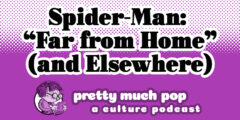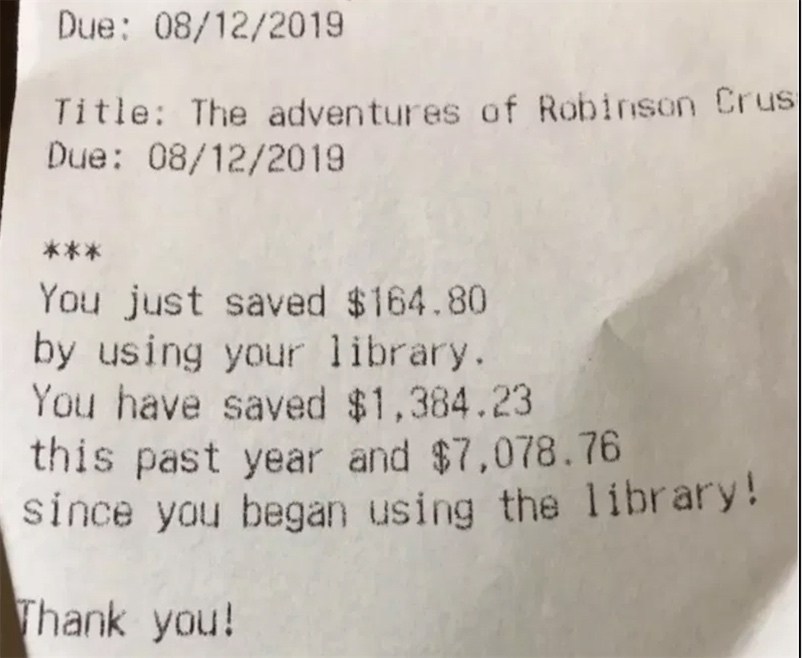[Most Recent Entries] [Calendar View]
Wednesday, August 28th, 2019
- “Jake Gyllenhaal Thinks Far From Home‘s Post-Credits Scene Is Part of Spider-Man’s Evolution” by Charles Pulliam-Moore
- “‘Spider-Man: Far From Home’ Gives Fans What They Want — But Asks Some Tough Questions, Too” by Noah Berlatsky
- “Review: ‘Spider-Man: Far From Home’ Is the Latest Iron Man Movie” by A.O. Scott.
| Time | Event |
| 7:30a | Pretty Much Pop: A Culture Podcast #8 Discusses Spider-Man: Far From Home and the Function of Super-Hero Films 
Mark Linsenmayer, Erica Spyres, and Brian Hirt finally cover a current film, and of course use it as an entry point in discussing the social function of super-hero films more generally, how much realism or grittiness is needed in such stories, whether to repeat or bypass the origin story, everlasting franchises, the use of multi-verses as a storytelling device, exaggerating the potential in a story of new technologies that the audience doesn’t really understand, and more. We touch on other bits of the Marvel Universe and the other Spider-Man films, the original Amazing Spider-Man #13 comic that introduced Mysterio, The Lion King, Watchmen, The Boys, Star Trek, Electric Dreams, the Rob Lowe “John Smith’s Bachelor Party” scene in Austin Powers, the recurring henchman in Spider-Man (actually Peter Billingsley, i.e. Ralphie in A Christmas Story), and the Exiles comic (a Marvel team that travels between multi-verses). Some articles we looked at for this episode include: This episode includes bonus content that you can only hear by supporting the podcast at patreon.com/prettymuchpop. This podcast is part of the Partially Examined Life podcast network. Pretty Much Pop is the first podcast curated by Open Culture. Browse all Pretty Much Pop posts or start with the first episode. Pretty Much Pop: A Culture Podcast #8 Discusses Spider-Man: Far From Home and the Function of Super-Hero Films is a post from: Open Culture. Follow us on Facebook, Twitter, and Google Plus, or get our Daily Email. And don't miss our big collections of Free Online Courses, Free Online Movies, Free eBooks, Free Audio Books, Free Foreign Language Lessons, and MOOCs. |
| 8:00a | Werner Herzog Narrates the Existential Journey of a Plastic Bag: Watch a Short Film by Acclaimed Filmmaker Ramin Bahrani "It's not what a movie is about," Roger Ebert famously wrote, "it's how it is about it." Subject matter, we might say, separates the weak filmmakers from the strong: those who require a striking "high concept" (killer doll, body switch, Snakes on a Plane) fall into the former group, while those who can make a film about absolutely anything fall into the latter. It's safe to say that not everyone is moved by the scene in American Beauty where the camcorder-toting teenager waxes poetic about his footage of a plastic bag in the wind. But what would similar material look like in the hands of a more assured director? For an example, have a look at Plastic Bag, the eighteen-minute short above. Every cinephile with an interest in American film knows the name of Plastic Bag's director, Ramin Bahrani. Over the past decade and a half he has emerged as the maker of unusually powerful and realistic glimpses of life in his homeland, focusing on characters like a Pakistani immigrant running a New York bagel cart, an orphan working at a chop shop, and a Senegalese cab driver in North Carolina. In its own way, the protagonist and title character of Plastic Bag is also at once an outsider to American life and a figure inseparable from it — and voiced by an insider-outsider of another kind, the German filmmaker Werner Herzog. (Their collaboration has continued: you may remember Herzog's appearance in a Bahrani-directed episode of Morgan Spurlock's series We the Economy about a lemonade stand.) Beginning his journey at a grocery-store checkout counter, he spends his first few happy days at the home of his purchaser. But not long after this idyll of service — carrying tennis balls, being filled with ice to numb a sprain — comes to its inevitable end, he finds himself deposited into a landfill. But the wind comes to his rescue, carrying him across a series of suburban, post-industrial, and finally rural landscapes as he looks desperately for his owner. Ultimately the bag makes it into places seldom seen by human eyes, with a combination of gravitas and wonder imbued by both Herzog's diction and the music of Sigur Rós' Kjartan Sveinsson. Watched today, Plastic Bag feels more elegiac than it did when it debuted a decade ago, since which time plastic-bag bans have continued to spread unabated across the world. How long before not just the hero of Bahrani's film, but all his polyethylene kind fade from existence — forgotten, if not quite decomposed? Plastic Bag has been added to our collection, 1,150 Free Movies Online: Great Classics, Indies, Noir, Westerns, etc.. Related Content: Werner Herzog, Morgan Spurlock & Other Stars Explain Economic Theory in 20 Short Films Werner Herzog Narrates Pokémon Go: Imagines It as a Murderous Metaphor for the Battle to Survive Werner Herzog Reads From Cormac McCarthy’s All the Pretty Horses Werner Herzog Creates Required Reading & Movie Viewing Lists for Enrolling in His Film School Watch Werner Herzog’s Very First Film, Herakles, Made When He Was Only 19-Years-Old (1962) Start Your Day with Werner Herzog Inspirational Posters Based in Seoul, Colin Marshall writes and broadcasts on cities, language, and culture. His projects include the book The Stateless City: a Walk through 21st-Century Los Angeles and the video series The City in Cinema. Follow him on Twitter at @colinmarshall or on Facebook. Werner Herzog Narrates the Existential Journey of a Plastic Bag: Watch a Short Film by Acclaimed Filmmaker Ramin Bahrani is a post from: Open Culture. Follow us on Facebook, Twitter, and Google Plus, or get our Daily Email. And don't miss our big collections of Free Online Courses, Free Online Movies, Free eBooks, Free Audio Books, Free Foreign Language Lessons, and MOOCs. |
| 2:00p | Public Library Receipt Shows How Much Money You’ve Saved by Borrowing Books, Instead of Buying Them
Wichita Public Library has a neat system. They write on their blog: "Every time materials are borrowed from the Wichita Public Library (WPL) customers receive a receipt showing how much they have saved in that visit, the year to date, and their lifetime savings. The information is displayed on the receipt similar to the ways that retail stores show savings to club members or coupon users." They then go on to add: "So far this year, the highest dollar amount saved by a customer's account is $64,734.12. And the highest dollar amount saved by a customer's account since this feature was implemented is $196,076.21." Every book adds up... Would you like to support the mission of Open Culture? Please consider making a donation to our site. It's hard to rely 100% on ads, and your contributions will help us continue providing the best free cultural and educational materials to learners everywhere. Also consider following Open Culture on Facebook and Twitter and sharing intelligent media with your friends. Or sign up for our daily email and get a daily dose of Open Culture in your inbox. via Reddit/Boing Boing Public Library Receipt Shows How Much Money You’ve Saved by Borrowing Books, Instead of Buying Them is a post from: Open Culture. Follow us on Facebook, Twitter, and Google Plus, or get our Daily Email. And don't miss our big collections of Free Online Courses, Free Online Movies, Free eBooks, Free Audio Books, Free Foreign Language Lessons, and MOOCs. |
| 7:00p | David Byrne Launches Reasons to Be Cheerful, an Online Magazine Featuring Articles by Byrne, Brian Eno & More
Happiness, we know, is hard to come by, even in the best times. And if we agree on nothing else, we might agree that these are not the best of times. An air of gloomy dread and outraged alarm prevails for good reason. There have been many other times in history to justifiably feel this way. In 1944, German Jewish philosopher Theodor Adorno—exiled for ten years from his home and sojourning through a U.S. he found increasingly fascist in character—resigned himself to quiet despair. “There is no way out of entanglement,” he wrote in his trenchant, gloomy collection of aphorisms, Minima Moralia. “The only responsible course is to… conduct oneself privately as modestly, unobtrusively and unpretentiously as is required, no longer by good upbringing, but by the shame of still having air to breathe, in hell.” Adorno’s absurdist melancholia came from many places: his assessment of capitalism’s inescapability, his survivor’s guilt, his generally morose temperament…. He rarely confessed to having happy thoughts even when things were going well. Another thinker of the period, philosopher of the absurd and a writer for the French Resistance during World War II, had a very different take on the question of happiness in dark times. Albert Camus reminded us that all times are dark times for someone. Speaking after the war in 1959, he castigated the idea that we should be shamed into misery. “Today happiness is like a crime,” Camus sneered, “never admit it. Don’t say ‘I’m happy’ otherwise you will hear condemnation all around.” One pertinent question both of these very different perspectives address is whether happiness is morally responsible. Former Talking Heads frontman, record label maven, and frequent cultural critic David Byrne has answered the question in the affirmative with his project, Reasons to Be Cheerful, first an online compendium of news stories, now a curated online magazine designed to be a “tonic for tumultuous times.” Reasons to Be Cheerful starts with the premise that we are subjected daily to “amplified negativity” that wildly skews our view of events around the world. It’s an old complaint; we’ve all heard, or voiced, a version of why don’t they ever show any good news? Byrne put his creative energy and resources behind the criticism to do something about it, “collecting good news,” he says, “not schmaltzy, feel-good news, but stuff that reminded me, ‘Hey, there’s positive stuff going on! People are solving problems and it’s making a difference!’” In their blurb for the introductory video at the top, the Reasons to Be Cheerful team describe the site as “an online editorial project” that is “part magazine, part therapy session, part blueprint for a better world.” The site’s “stories of hope” don’t shy away from sentiment, but they are “rooted in evidence” and purport to show “smart, proven, replicable solutions to the world’s most pressing problems.” A sampling of articles currently on the site gives us a story about how lawyers might “end up saving the world” by taking on polluters the way they took on the tobacco industry; a piece about how cheap solar in China has “fueled the world’s green-energy revolution”; and essays about education in prison and the creation of a public waterfront from donated private property on Lake Erie. This being a David Byrne project, there is also, of course, a story about "the way to a two-wheeled utopia." The current edition features several articles by Byrne himself, and another by Brian Eno. Byrne and the editors and writing staff make no explicitly political statements, but they clearly value things like quality public education, clean air and water, a sustainable climate, and the creation of more public space—all areas that are now vastly under threat. Whether or not you find your own reasons to be cheerful in this commitment to positive journalism may depend on who and where you are, and whether you tend to see the world more like Adorno or Camus. Related Content: Albert Camus Explains Why Happiness Is Like Committing a Crime—”You Should Never Admit to it” (1959) Josh Jones is a writer and musician based in Durham, NC. Follow him at @jdmagness David Byrne Launches Reasons to Be Cheerful, an Online Magazine Featuring Articles by Byrne, Brian Eno & More is a post from: Open Culture. Follow us on Facebook, Twitter, and Google Plus, or get our Daily Email. And don't miss our big collections of Free Online Courses, Free Online Movies, Free eBooks, Free Audio Books, Free Foreign Language Lessons, and MOOCs. |
| << Previous Day |
2019/08/28 [Calendar] |
Next Day >> |



